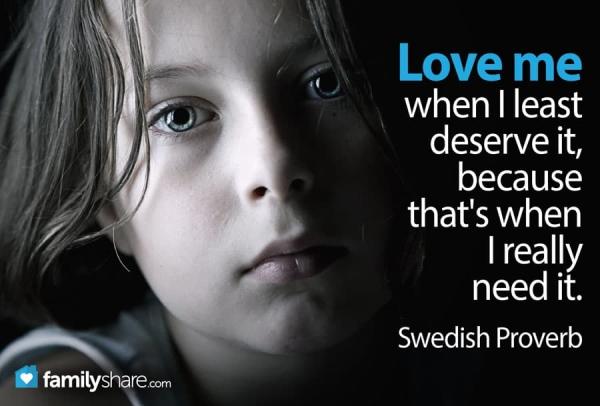
If you have a kid who seems unlovable, you are not alone. Just know that this can be overcome through patience, love and learning.
There are many reasons that cause us to think that a child is unlovable. Maybe his personality does not match yours, maybe she is a troublemaker, perhaps there are extenuating circumstances that alter your perception of him. Whatever the reason, as a parent, you have to find a way to fully love her, regardless of any behavior or personality trait.
Within my own family, my six children have very different personalities. Some are sweet and loving, some are strong-willed or spunky, others are funny and entertaining. But, dealing with one of our sons has been harder.
He's our third, 7 years old. He threw tantrums anytime, anyplace including school, church, and the store. Throwing himself in a heap on the floor, or street, is not even safe. Kind of an odd child, we have had him tested for a myriad of issues: Asperger's Syndrome and other forms of autism, sensory processing disorder, depression and anxiety.
In the majority of our family pictures, he is scowling or has a blank stare. Other behaviors that have come (and some that have passed) include; not wanting to wear long pants or jackets, having to be first whether in a race or getting dressed, completely falling apart when he did not get his way, repetitive behaviors and bed-wetting.
We struggled to love him - especially my husband. We had feelings of hopelessness. We didn't know what to do. We tried all sorts of things like discipline, being firm, praying, the aforementioned testing and supplementation.
Finally, this school year, we went through testing again with a different school psychologist. The conclusion? He's really intelligent with some obsessive compulsive tendencies. We tested his IQ and found that it is high;exceptionally high in several areas.
To us, this explains how his brain is wired differently. He sees the world in a unique way. He doesn't like story books, but prefers non-fiction. He rattles off facts about astronomy and, despite never being taught, he can do multiplication in his head. He loves to build creations out of Lego bricks.
Learning about him has helped make him easier to love because we are better able to understand him. I can now see why he does certain things and why he behaves the way he does.
All children desperately need to be loved. Loving my children is important to me, so I did not give up. I kept working to find answers. Regardless of your situation, here are some suggestions that may help you find ways to love your unlovable child.
Get to know your child
Whether it's by observation, spending one-on-one time together or having her tested by her doctor or at school; getting to know your child is central to understanding her. There are reasons for behaviors and the answers are there. Be persistent with whatever means you think will help the most. It may be a combination of activities.
Be patient
It takes time to discover all of the pieces to your puzzle. For us, there were many steps, many pieces that came trickling in one at a time. There are still things we are learning about our son.
Spend quality time together
Nothing can replace an available parent to a child. Ask him what he wants to do together. Go on parent and child dates together. Find his Love Language. He needs to know that he is important and loved. This is also key in getting to know and understand your child.
Seek advice from professionals or others in your life
Present your concerns to your doctor, your child's teacher or psychologist. See what information is available and what they have observed about your child. Also, family and friends may have some insights that you might have overlooked.
Don't give up
Keep asking, keep praying or meditating and keep searching for answers and new information. Answers will come, but it may take time. Each child is unique and has needs that must be met. As a parent, it is your responsibility to meet those needs. It can seem hopeless at times, and you might want to quit, but your child needs you to keep trying.
Though circumstances may differ, it is possible to love each child fully and completely. It may take work on your part, but the results and benefits will be worth it.

